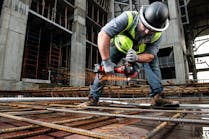The Covid-19 pandemic reinforced the need to deliver the highest levels of workplace health and safety. This is even more important across the U.S. renewables sector as government approval to resume operations sees workers in solar and wind operations returning to remote locations.
Making sure projects move seamlessly forward depends in part on protecting and ensuring worker health and safety. Although fixed clinics will always be essential, they cannot provide preventive care or treatment where an emergency occurs as the project progresses. Solar and wind farms, for example, can span tens, hundreds, or thousands of miles, as can pipeline projects. With Mobile Treatment Centers (MTCs) like those used by Remote Medical International (RMI), health and safety support is always nearby.
Kimmell is RMI's global assistance & security director and is responsible for leading its Global Assistance Services, Fleet Management, and Security teams.
MTCs create an opportunity for medics to be on the right of way with workers every day. They talk with workers, complete informal assessments, provide water and electrolyte drinks, and learn activity patterns. This knowledge helps medics identify potential problems, proactively address them, and often avoid a potentially major incident.
Additionally, these mobile clinics reassure safety managers that expert medical aid is available when it’s needed while reinforcing the safety team messaging. For example, a worker injured his thumb on one project and immediately received treatment and medication that may have prevented infection at the MTC. While helping, the paramedic provided tips on preventing future injuries. Without the MTC, it would have taken hours to transport the worker, secure treatment, and return to work. With the MTC, it only took about 20 minutes.
The four-wheel-drive MTCs position medical providers near construction activities at remote project locations. These sites often experience extreme heat, cold, and wind conditions. As the working site moves, a mobile solution ensures that medical teams and equipment go with the project. This mobility is the only way to deliver immediate medical care and keep workers onsite for treatment when possible.
In addition, traveling with workers helps medical teams build trust and gives workers the confidence to go to the MTC even for minor injuries without concern for their job security. This trust allows medics to find undiagnosed conditions like diabetes, hypertension, and asthma, which, if left untreated, could lead to serious, potentially life-threatening, situations. Treating and managing chronic diseases reduces the chance that a worker will be injured or potentially injure someone else.
With MTCs, owner/operators, and Engineering, Procurement, and Construction (EPC), companies who partner with professional medical consultants have confidence that medical issues will be treated appropriately and quickly. This immediate treatment can help avoid unnecessary and excessive off-site referrals, treatments, and prescriptions. Minor injuries can be resolved at the site, allowing workers to return to work more quickly.
If a patient requires advanced treatment, the mobile teams can provide emergency care until they can evacuate the party per the site’s unique Medical Emergency Response Plan. MTCs come stocked with the medical equipment and supplies needed for primary and emergency care, including an automated external defibrillator and trauma management equipment. They also provide treatment space that is protected from weather and separated from other workers.
With MTCs, medical teams can focus on preventive care and take a proactive approach that creates safer working environments, reduces recordable incidents, and ultimately improves and saves lives. In remote environments and projects whose locations migrate as the work progresses, they are the most effective and efficient way to ensure worker safety and health.





